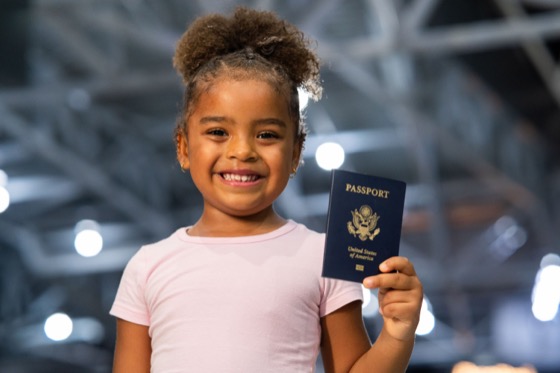
Getting a passport for a minor (age 15 or younger) is more complicated than getting an adult passport. Based on our over 20 years helping readers with their travel document needs, this can lead to a lot of questions if your child needs a passport.
If you arrived on this page of our website, you may want to first read through our complete guide to getting a passport for a minor where you will find details of the process, links to the forms you need to fill out, current passport fees for a child's passport, and what additional information you need to provide with a minor's passport application.
On this page, you will find answers to specific questions about fees, documents, names, and many other unique cases submitted by our readers.
If you have further questions after reading the step-by-step instructions, you can return to this page and search for answers to questions similar to your own.
✈️ Need Your Passport Fast?
Traveling soon? Our trusted expedited service offers same day passport expediting at 15% off or choose Priority Service, their most popular option, for delivery in just 7–9 business days .
For each of the questions in the FAQ below, click the link to access the complete answers.
Frequently Asked Questions about Passports for Minors
Parental consent to get a child's passport Information about parental consent to apply for a passport for a minor age 15 or younger when one or more parents cannot appear with the child.Renewal of passport issued to a minor child Informaton about applying to renew a child's passport. Answers to questions about requirements, documents, consent and more.
Passports for children in foster care Question: I'm the social worker for a 15 year girl in foster care. No one knows where her parents are located, so no signatures can be obtained. After ...
Can my minor children get passports without their fathers consent? Question: I have sole custody of my 2 children ages 13 & 10. Their father has made no effort to see them in over 6 years. Can they still get their passports ...
How do I expedite my children's passports without airline tickets? Question: I am so short of time to renew or get new passports for my children. I know it can be done but it seems every passport service agency that I've inquired are all asking for a plane ticket as one of the requirements but in our case were not flying...
Do I have the necessary documents to renew passport for my foreign-born adopted child? Question: My husband and I are both US-born citizens. We adopted our son from Russia in 2003. He is now 9 years old. He has a US passport which expired ...
Guide to Using a Stepparent's Surname on a Minor's Passport Question: There has been an influx of requests for this type of name change in recent years, so it's important to know the challenges the natural parent and stepparent may face.
Guide to Using a Guardian's Surname on a Minor's Passport Question: Can a guardian's surname that is different from the child's parents' be used, legally, on a child's passport?
Does a US birth certificate of a foreign born adopted child serve as proof of citizenship? Question: My daughter was adopted from Guatemala. We immigrated her to the US on a Guatemalan passport. She had a green card. We recently completed ...
Passport for Minor Child with No Contact with Mother Question: My husband has his two children from another marriage. We have been trying to contact her via phone and through a lawyer to have her sign the ...
Can One Parent Apply for a Passport for a Minor Answers to questions about one parent applying for a passport for a minor age 15 or younger.
Is there anyway to get a passport for my child without their father's notarized statement? Question: I'm planning on taking my two kids to Canada to visit my boyfriend's family in a few months. Their dad and I are not civil so when asked by ...
Can you apply for a passport for a child for whom you do not have custody? Question: Daughter's biological mother would like to apply for a passport for her but she does not have custody of her and also does not live with her....
Passport for Child without Parent's Consent Answer to questions about passports for children obtained without the consent of one parent.
How to get a passport for a child who has not seen his father in over 10 years? Question: I would like to take my son to Canada so he'll need a passport. The problem is we don't have contact or dealings with his father. It has ...
How do I find out if a passport was issued to my child? Question: I have primary custody of my children. My ex-wife has recently moved to Canada with her new husband. My children go to spend summer vacations ...
Passport for minor about to turn 16 Question: I need a passport for my son for travel in early June. He will turn 16 1 month before we leave. In order to get the passport in time, it ...
Traveling Minor Question: If a father is taking his minor child out of the country, and the parents are still legally married, does the mother have to sign a consent ...
Can my 9 year old daughter obtain a passport without my permission? Question: The mother and I made an agreement that she was taking my daughter on a cruise. I later found out that she(the mother) was not attending this ...
Passport requirements for a minor with only one parent listed on their birth certificate Question: I am a single parent listed on my child's birth certificate. My child needs to get a passport but it ask for both parents. What can I do or ...
My child has autism and needs a passport Question: I tried to get a passport for my child who is 14 years old at the local post office. I tried to explain to the women working there that my ...
Need Passport for My Children Question: I was deported to Colombia. My children are in New York with my mother. They want to come see me. My son had a passport before. He came to ...
Do I need to provide photos of my one-month-old child in order to get a passport for him?
Question: My child is only one-month old. Do I still need to provide his photos in order to obtain passport for him?
Answer: Two identical photos ...
passport for child in adoptive placement
Question: We have signed papers for adoptive placement. We were fostering. 4 year old will not be officially adopted by us until after our trip.
Answer:...
Is a minor's previous passport that has not expired enough identification to get a new one? Question: My minor daughter's passport expires in Oct 2010. Since her current passport has not expired yet, is it enough documentation to take to get ...
Passport for child with notarized letter from parents Question: Can I obtain a passport for a child with a notarized letter from her parents, her original birth certificate and her SSN? I am...
Do I have to submit the original documents for evidence of US citizenship and evidence of relationship or can I provide photocopies? Question: My child is a minor under 16 and born outside of the US (in Taiwan). As Evidence of U.S. Citizenship I will present his Certificate of Citizenship(...
Items required for passport for child and what is the age limit to be considered a minor?
Question: I understand the evidence of citizenship would be a Birth Certificate. Is that correct? What is 'evidence of identity?'
Is a 14 year old ...
I am USA citizen and my child is not. Can she get USA passport? Question: I became USA citizen two years ago. My daughter is 14 and holds permanent resident card. Can I apply for USA passport for her without applying ...
American citizen father with daughter born in Winnipeg, Canada. - how to get passport for her?
Question: My daughter was born in Winnipeg, CA (mother and daughter coming back to the United States on Canadian passports)
State Dept website states ...
Unable to locate my child's father to obtain notarized consent. Question: My daughter's passport just expired 3/1/10, at the time I obtained that passport I was able to locate her father in jail and he was able to ...
My 9 year son's passport expired last year. What form do I need to fill out to renew his passport? Question: My son's passport expired in October 2009. I would like to renew his passport and was wondering which forms I need to fill out for his renewal....
Does a minor under the age of 16 need to be present at the time of application?
Question: If a parent is applying in person at a passport office, does the applying minor child need to be present?
Answer: Yes, minors must appear ...
Will a notarized statement from her grandparents passing custody to me and her birth certificate allow me to get her a passport? Question: Eight months ago through a paternity test, I found out that I have a 14 year old daughter in Washington State. Her mother had passed away ...
What paperwork do I need and what is the cost of getting passports for my children? Question: My childrens' passports expire in April. I need to have new ones for a trip in July. Since I cannot "renew" their passports, what paperwork ...
Expired child's passport Question: My granddaughter has an expired passport. She is now 14 & I want to take her to Europe when she is 15. Can I apply for a passport for her or ...
Can we get passports for grandchildren for whom we have temporary custody? Question: We are the grandparents of 3 grandchildren and have court ordered TEMPORARY CUSTODY that has lasted more than 3 years. The children were abandoned ...
Minor's Passport Information
Instructions for obtaining a passport for a minor age 15 or younger
Acceptable documents for establishing parent/child relationship.
Click here to expedite a minor's passport in 24-48 hours
Top 5 Questions About Expedited Passport Couriers
2. What exactly does a passport expediter do?
3. Are passport expediting services legitimate?
4. How can I identify a reliable passport expeditor?
5. Is expedited passport service worth it?
Get answers to these questions and more in our Ultimate U.S. Traveler's Guide to Passport Expediters.
You can also visit our library of articles about passport expediting.


